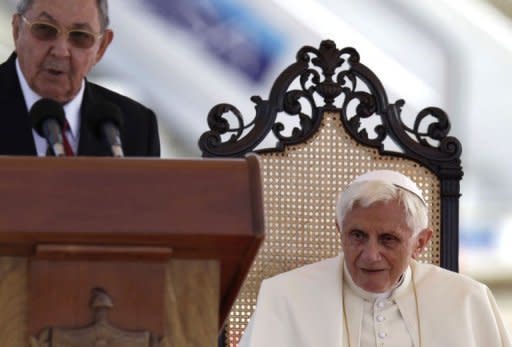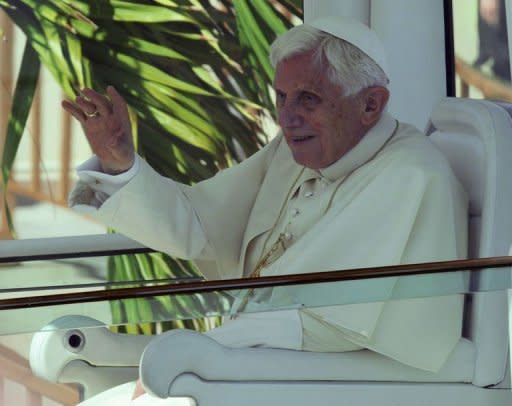Pope arrives in Cuba, first papal visit since 1998
Pope Benedict XVI arrived Monday in Cuba seeking to boost his Church's special dialogue with the Communist regime, as dissidents said more than 150 people were arrested to derail protests. President Raul Castro and a delegation of church officials greeted the 84-year-old pontiff at the airport in Santiago, Cuba's second largest city, where a massive crowd was expected to gather for mass later in the day. After a visit to predominantly Roman Catholic Mexico, the pontiff is seeking to bolster close church-state ties in Cuba -- the Americas' only one-party Communist state -- while also urging authorities to embrace change. "I come to Cuba as a pilgrim of charity, to confirm my brothers and sisters in the faith and strengthen them in the hope which is born of the presence of God's love in our lives," the pope said in the southeastern city. "I carry in my heart the just aspirations and legitimate desires of all Cubans, wherever they may be, their sufferings and their joys, their concerns and their noblest desires," he added. "I am convinced that Cuba, at this moment of particular importance in its history, is already looking to the future, and thus is striving to renew and broaden its horizons." Marxism "no longer corresponds to reality," Benedict said last week as he set off on his first trip to Spanish-speaking nations in Latin America, calling for "new models" in Cuba, which was officially atheist until the early 1990s. "Cuba has good relations with all religious institutions in our country," Castro, 80, told the visiting pontiff. Benedict rode in his white Mercedes Popemobile down the streets of Santiago, as crowds of enthusiastic Cubans waved yellow and white Vatican and Cuban blue, white and red flags to greet him. After Monday's mass, the pope was due to visit a shrine outside Santiago on Tuesday and then head to the capital Havana, where he was to say another mass on Wednesday in the capital's Revolution Square. Cuban authorities have rounded up at least 150 dissidents in the past few days to stop any demonstrations during the two-city papal visit, the head of an opposition group told AFP in Havana. "So far the Cuban Human Rights and National Reconciliation Commission can confirm that in the past four days at least 150 peaceful dissidents have been arrested," said Elizardo Sanchez, head of the illegal but long tolerated dissident information clearinghouse. "There were roundups to prevent" problems during the visit, he said, adding that a similar number of activists had been barred from leaving their homes during the visit. At least 15 of those detained were members of the Ladies in White, a prominent group of wives and family members of jailed political opponents, according to the dissidents. Santiago is just down the mountain from Cobre, home to an important shrine marking its 400th anniversary this year which the pope came to celebrate. A crowd of up to a million people, out of a population of about 11 million, were expected to turn out for Monday's mass at 2230 GMT -- about the same number that welcomed John Paul II 14 years ago, authorities say. John Paul II's 1998 trip was the first papal visit to Cuba. Expectations were high then that the charismatic Polish pontiff might help spark change in Cuba after decades of centrally-run government, economy and media. He did indeed help start a steady thaw, and then cooperation, in local Catholic relations with the Cuban government. But more than a decade later, despite John Paul II's calls for Cuba to "open up to the world," the country remains isolated, and its economy is still centrally planned. Most Cubans earn less than $20.00 a month. The Catholic church has nonetheless emerged as the most important non-state actor in mainly secular Cuba, even mediating prisoner releases. But it does not enjoy free rein on the Caribbean island. Church officials say Benedict, who is German, is keen to spark new and renewed faith in Cuba. But he also has had to walk a fine line amid rising calls for more opening up than the Cuban government has sought so far. "The Holy See knows the ideological positions of the Cuban government" and the government "is aware of the views of the Church," said Archbishop Dionisio Garcia of Santiago. Benedict has no plans to meet with members of the Cuban opposition. The pope "knows the Cuban reality" and whether "he meets with the opponents or not does not mean he is unaware" of their situation, Garcia said Saturday. "Pushing hard and insisting on (Benedict) meeting with the Ladies in White (or other dissidents) could complicate matters for the Church," added Michael Shifter, president of the Inter-American Dialogue in Washington. "It is very difficult. And they have to strike this balance. ... They don't want to jeopardize the gains" the Church has made in recent years, he added.



